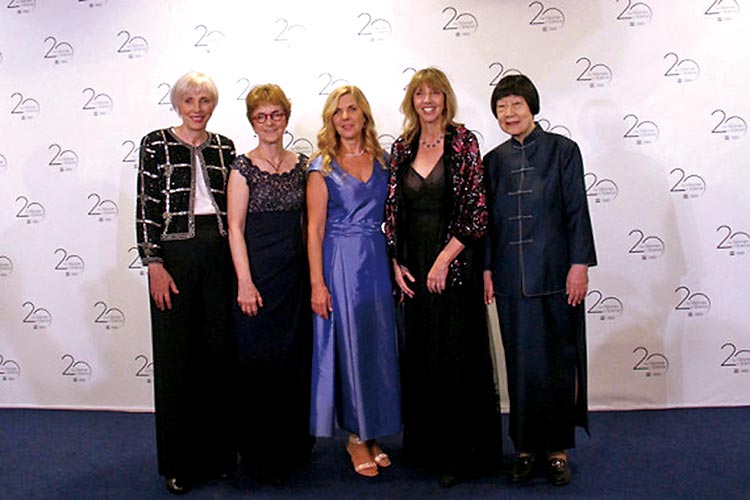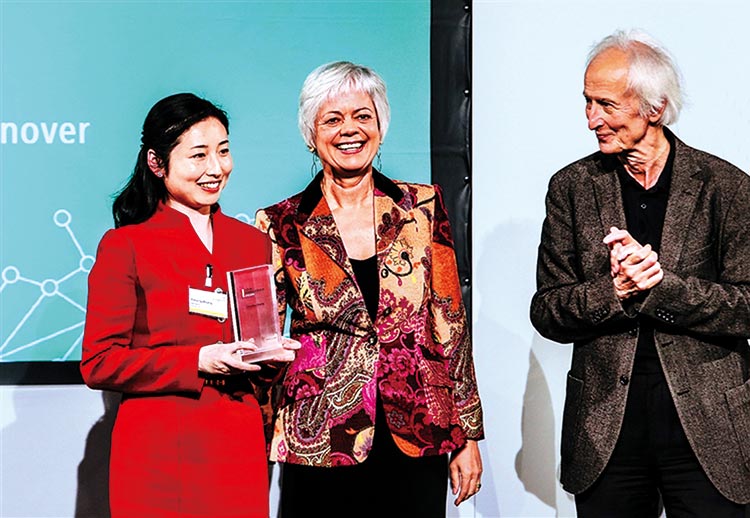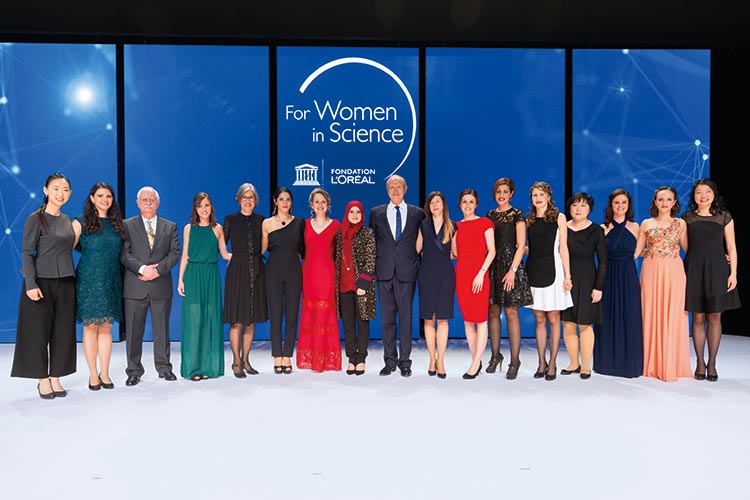
Written by: Zhang Baoshu
Posted on: October 25, 2018 |  | 中文
| 中文
Chang Meemann recieving her award
At a ceremony held at the UNESCO's headquarters in Paris, 2018, Meemann Chang, an 82-year-old female scientist was honored for, "her pioneering work on fossil records leading to insights on how aquatic vertebrates adapt to life on land," as mentioned by the United Nations Educational, Scientific and Cultural Organization (UNESCO).
According to the awards’ organizers, her longstanding commitment has offered China the opportunity to establish itself in the field of paleontology and develop a dynamic research environment that gives birth to new generations of eminent scientists. Chang is a professor at the Institute of Vertebrate Paleontology and Paleo-anthropology and a member of the Chinese Academy of Sciences based in Beijing.
Chang delivered her acceptance speech and reviewed her scientific life in five languages, including French and English. Her spirit of diligent research and perseverance, outstanding skills in foreign languages, and sincere humorous words touched the audience and attracted the world.
The Chinese laureate said that she was “very honored” to receive this year's UNESCO for Women in Sciences Award, paying tribute to the efforts of her partners around the world, including her Russian and Swedish teachers who helped her at the start of her career six decades ago.

"My work explores fundamental questions about who we are and where we came from," says Professor Meemann Chang, who in a long career examining fish fossils has discovered some of our earliest ancestors.
The award given to Chang was co-founded by UNESCO and the French cosmetics company L’Oreal in 1998. Every year, it is given to five outstanding female scientists from different parts of the world to honor their ground-breaking works that contribute to solving major scientific problems.
Chang is one of the world’s most famous paleoichthyologists. Starting from her first job at Institute of Vertebrate Paleontology and Paleo-anthropology after her return to China in the 1960s, she has devoted almost 60 years to paleoichthyology. Based on abundant and solid observations and researches on wild fossils, she originally proposed and proved that Youngolepis and Diabolepis are both primitive species of lungfish, and were the species of lobe-finned fish about 430 million or 400 million years ago, evolving from the shallow sea in the tropical area of East Yunnan to land. Such research results shook the authority of the traditional Sweden academy and made Chang the explorer of this great discovery by arguing that lobe-finned fish, a key class of fish involved in the adaptation to life on land in the evolution theory, originated in neither Europe nor North America but in Yunnan, China.
Like Chang, five more Chinese scientists won the award --- Prof. Li Fanghua, Academician of the Chinese Academy of Sciences (2003), Prof. Ye Yuru (Nancy Ip) of the Hong Kong University of Science and Technology (2004), Prof. Ren Yonghua (Vivian Wing-Wah Yam) of the University of Hong Kong (2011), and Prof. Xie Yi of the University of Science and Technology of China (2016).
On Oct. 5th, 2015, Karolinska University Hospital announced in Stockholm that Chinese scientist Tu Youyou won the Nobel Prize in Physiology or Medicine, together with a Japanese scientist and an Irish scientist for their contribution to the research of the treatment of Malaria. Tu became the first Chinese citizen to receive a Nobel Prize in any category and the first Chinese scientist to receive a Nobel Prize in Physiology or Medicine.
On Dec. 10, 2015 at Konserthuset, Tu accepted her diploma and gold medal from King Carl XVI Gustaf. In her acceptance speech, she reviewed the hardships of her research life and encouraged scientists from all over the world to explore the treasure of Chinese culture, so as to bring benefits to mankind. With the publicity of the media and representation by Tu Youyou, Chinese female scientists have left a very deep impression to the world.
“This award does not only honor me but also the Wuhan University and the Chinese chemistry circle.” On March 27, 2012, Prof. Zhang Lina of Wuhan University, Academician of the Chinese Academy of Sciences delivered her acceptance speech online, on receiving her Anselme Payen Award from the ceremony, specially held in San Diego for her.
Though she did not attend the ceremony because of her illness, her elegant appearance and demeanor received cheers and applauses. Anselme Payen Award is the highest international honor given to any scientist conducting cellulose and its allied products research. The award goes to only one scientist every year, and Zhang is the first Chinese scientist to win it for her ground-breaking achievement in studies of low-temperature aqueous solutions.

On November 17th, 2015, Associate Professor Zhuang Xiaoying of the College of Civil Engineering, Tongji University, won the Sofia Kovalevskaya Award, which is given by the BMBF (Bundesministerium fur Bildung und Forschung) every other year to encourage and honor the outstanding young academics who come from different countries and do scientific research in Germany. The president of Alexander who won the Humboldt Foundation said that Zhuang was excellent in all aspects of her research and her experience of studying in China, the U.K., and Norway made her an ideal laureate of the award.

On March 23rd, 2017, at the L’Oreal-UNESCO for Women in Science Award Ceremony held in Paris, Dr. Long Ran, a female scientist of University of Science and Technology of China, won the “2017 International Rising Talent” award, which was founded in 2015 by UNESCO and other organizations to honor 15 most promising young women scientists every year, providing them with academic funds to conduct their scientific projects. By utilizing synchrotron radiation, Long made progress in the study of carbon dioxide conversion and stood out among many other young scientists.
Translated by Zhu Siyu
You may also like: